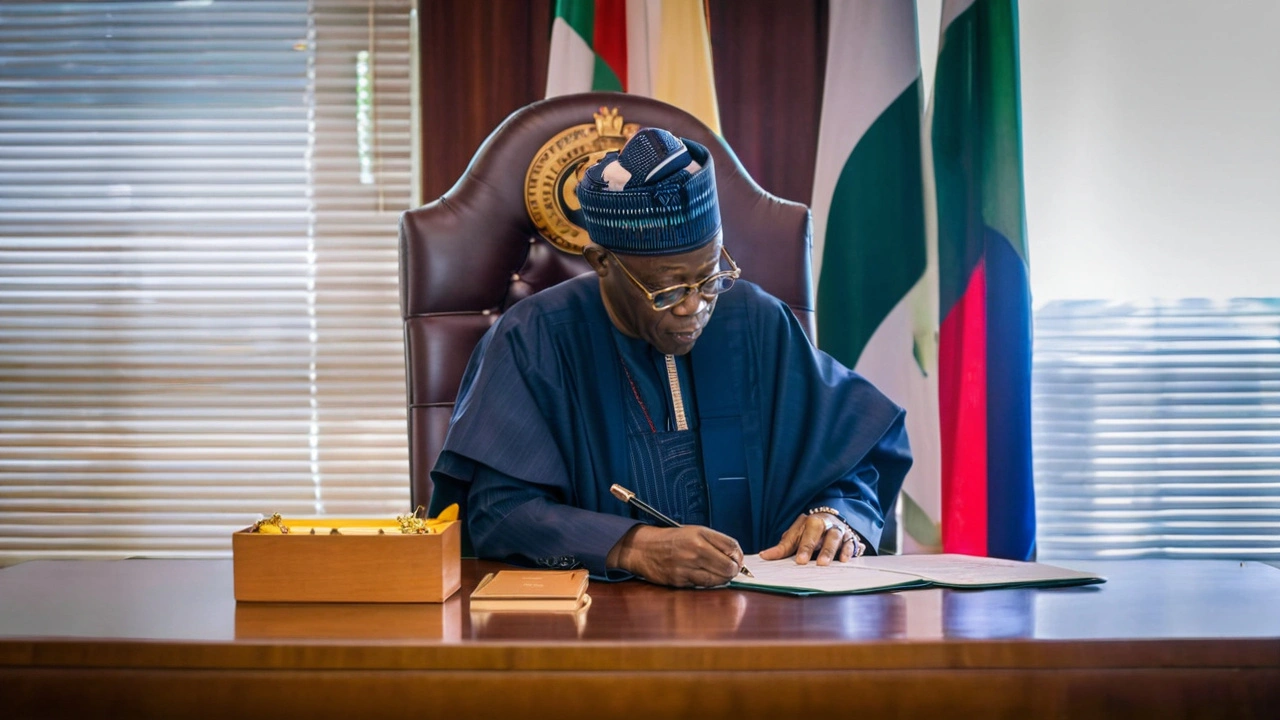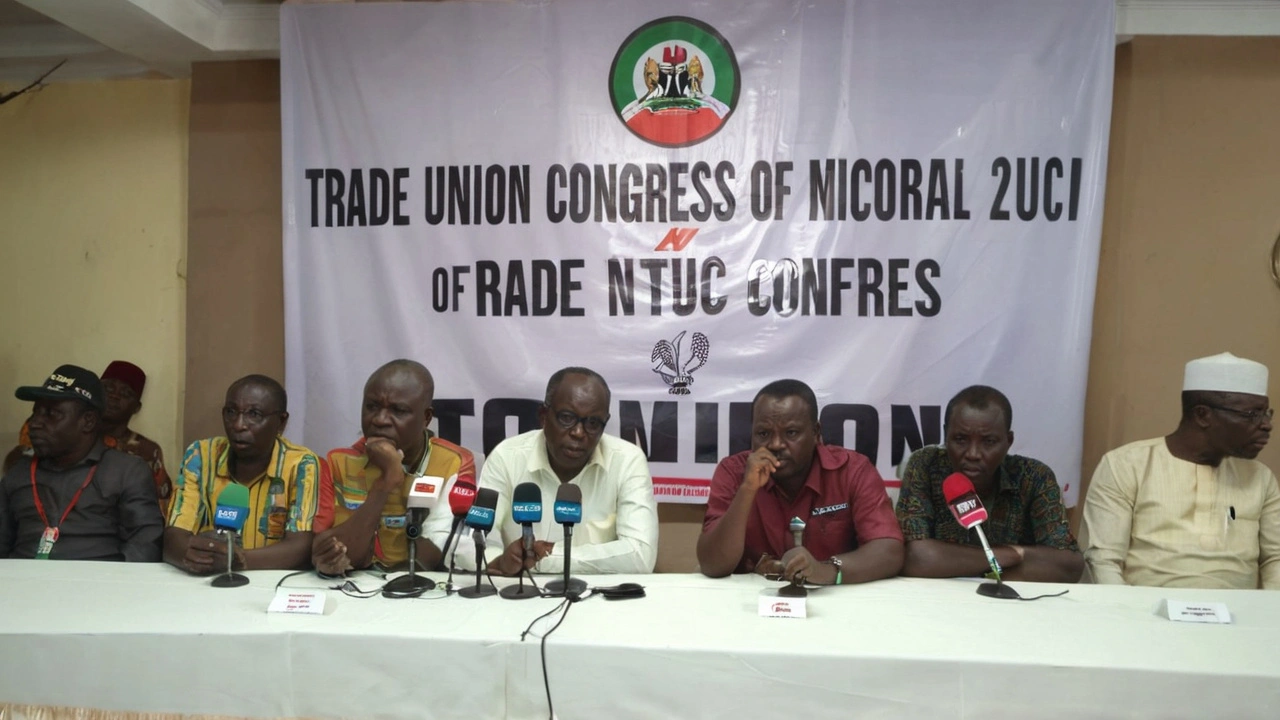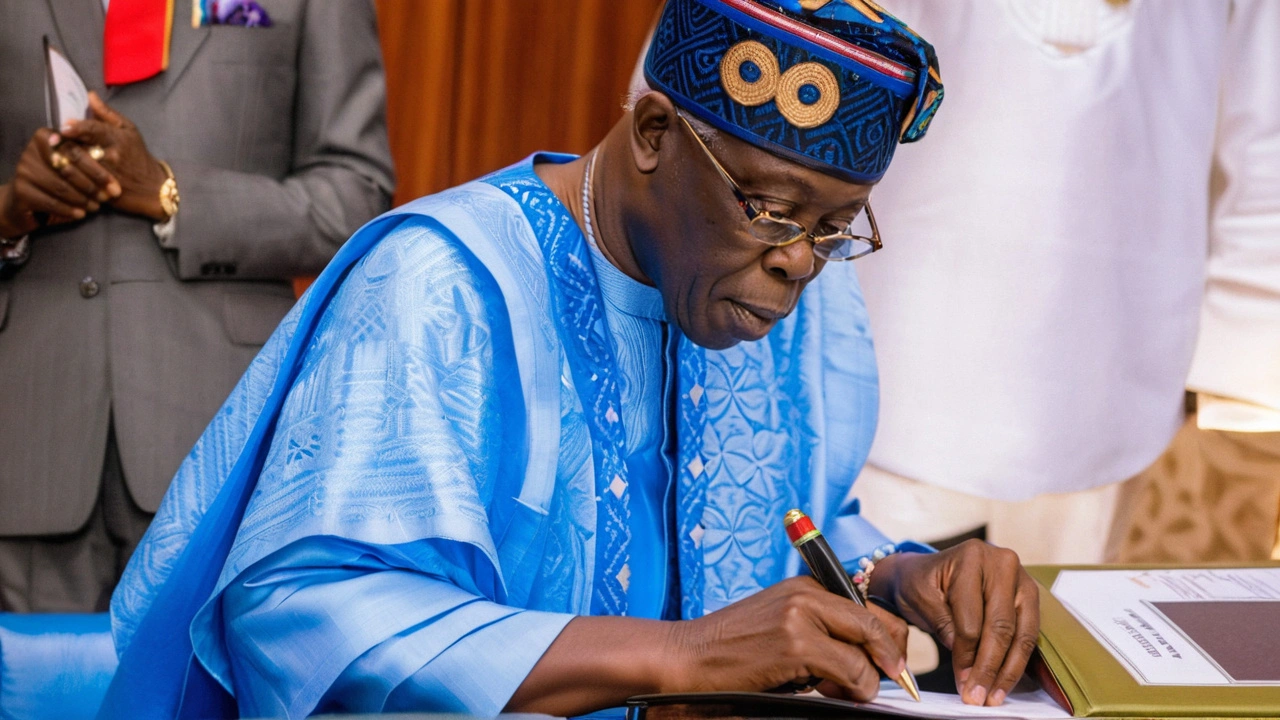Introduction
In what could be a monumental shift for workers across Nigeria, President Bola Tinubu has received the much-anticipated ₦70,000 minimum wage bill. This critical piece of legislation, transmitted to him by the National Assembly, promises to uplift the livelihoods of countless Nigerian workers by significantly increasing the current minimum wage. The bill was meticulously reviewed and passed by both the Senate and the House of Representatives, indicating strong legislative support for this major economic policy change.
The Current Situation
Nigeria's existing minimum wage stands at ₦30,000, a figure that many have argued is insufficient given the country's high cost of living. Workers have long complained about the inadequacy of their wages, which many say cannot cover basic necessities such as food, rent, and healthcare. Inflation, coupled with rising living costs, has exacerbated the economic strain on Nigerian households. According to the National Bureau of Statistics, the inflation rate soared to over 17% this year, making it imperative for the government to take action. Thus, the proposed increase to ₦70,000 seeks to offer a respite to the economic challenges that millions of Nigerian workers currently face.

Legislative Journey
The journey of the ₦70,000 minimum wage bill has been anything but straightforward. Initial proposals met with considerable debate and scrutiny in both chambers of the National Assembly. Lawmakers conducted multiple sessions and public hearings to gauge the sentiments of various stakeholders, including labor unions, employers, and economic experts. The bill went through numerous amendments to address concerns about its potential impact on small and medium-sized enterprises (SMEs), as well as the overall economy. Ultimately, the Senate and the House of Representatives reached a consensus, recognizing the urgent need to improve worker welfare amidst growing economic challenges.
Anticipated Impact
If signed into law, the ₦70,000 minimum wage bill is expected to have far-reaching effects on Nigeria's economy and the day-to-day lives of its citizens. Proponents argue that the increase will boost consumer spending, thereby stimulating economic growth. Higher wages could lead to improved productivity as workers are likely to be more motivated and healthier, given their ability to afford better living conditions. Moreover, the wage increase aligns with President Tinubu's campaign promises to address economic disparity and uplift the poor.
However, there are also concerns about potential downsides. Critics warn that SMEs may find it challenging to cope with the increased wage bill, potentially leading to layoffs or even business closures. Additionally, there are fears that without corresponding measures to curb inflation, the increased wages could lead to even higher prices for goods and services, thereby negating the intended benefits.

Government’s Plan
President Tinubu has been in discussions with the leadership of the National Assembly and relevant stakeholders to finalize the bill. A meeting has been scheduled to iron out the remaining details and ensure a smooth implementation once the bill is signed into law. The government is also considering complementary measures to support businesses during the transition period. These may include tax incentives, subsidies, and other economic relief packages aimed at cushioning the impact on SMEs.
While the exact date for the signing of the bill has not been disclosed, sources close to the presidency indicate that it is likely to occur shortly. The administration appears keen on leveraging this momentous decision to gain public goodwill and demonstrate its commitment to economic reform and social justice.
Public Reaction
The reception to the proposed wage increase has been overwhelmingly positive among workers and labor unions. Many see it as a long-overdue measure that will drastically improve their quality of life. Labor unions have praised the bill as a victory for workers' rights, attributing its successful passage to relentless advocacy and negotiation.
On the other hand, some business owners and economic analysts remain cautious. They emphasize the need for a balanced approach that considers the sustainability of businesses, especially SMEs. There are calls for the government to engage more with the private sector to develop strategies that will offset any negative impacts of the wage increase.

Conclusion
As Nigeria awaits President Tinubu's final decision, the country's workforce holds its breath. The ₦70,000 minimum wage bill represents a significant step towards addressing the economic disparities that have long plagued Nigerian workers. While challenges and concerns remain, the potential benefits of this policy cannot be overstated. If implemented thoughtfully and supported by additional economic measures, this wage increase could mark the beginning of a new era of economic resilience and social equity in Nigeria.
The nation looks forward to the President's endorsement of the bill, hopeful that it will be a milestone in the journey towards a more equitable and prosperous Nigeria.







Arun kumar Chinnadhurai
July 26, 2024 AT 19:58Hey everyone, great to see the buzz around the new minimum wage bill. The increase to ₦70,000 could really lift many families out of daily strain. It’s vital that workers get a wage that matches the rising cost of living. Let’s keep the conversation focused on how to make the transition smooth for both employees and small businesses.
Stay hopeful and keep pushing for fairness!
Aayush Sarda
July 27, 2024 AT 07:05Distinguished colleagues, the provisions within the proposed legislation demonstrate a commendable commitment to socioeconomic equity. However, one must not overlook the potential macro‑economic repercussions that may ensue. While the intent is laudable, the financing mechanisms require rigorous scrutiny. A balanced approach will preserve both labor rights and market stability.
Mohit Gupta
July 27, 2024 AT 18:11Man wow!!! This is huge news!!! Workers finally getting some respect!!! Can’t wait to see the cash flow!!!
Varun Dang
July 28, 2024 AT 05:18I’m genuinely thrilled about the prospect of a higher baseline wage. When workers earn enough to afford basic needs, productivity typically climbs, benefiting the entire economy. Moreover, the psychological boost of feeling valued can’t be understated. It’s a step toward a more inclusive growth model. Let’s also encourage the government to pair this with training programs so skills match wages.
Stavya Sharma
July 28, 2024 AT 16:25While the rhetoric surrounding the bill is undeniably positive, the practical implications for SMEs remain problematic. Many small enterprises operate on razor‑thin margins and may struggle to absorb the added payroll burden. It would be prudent for policymakers to conduct impact assessments before implementation. Otherwise, we risk unintended layoffs that could negate the intended benefits.
chaitra makam
July 29, 2024 AT 03:31It looks like the new wage could help many families cover basics like food and rent. The government might also consider tax breaks for small firms to ease the shift. Keeping things simple and clear will help everyone understand the changes.
Amit Agnihotri
July 29, 2024 AT 14:38This wage hike sounds idealistic but could cripple small businesses.
Erica Watson-Currie
July 30, 2024 AT 01:45Change is the only constant and wages are no exception
Mark Pelletier
July 30, 2024 AT 12:51The discourse on a national minimum wage invitation invites us to contemplate the very essence of economic justice. When a state declares a baseline compensation, it signals its acknowledgment of the inherent dignity of labor. Yet, the figure itself is a moving target, constantly reshaped by inflationary tides and market dynamics. In Nigeria’s case, the leap from ₦30,000 to ₦70,000 is more than a numeric adjustment; it is an attempt to recalibrate societal expectations. Proponents argue that fair wages stimulate consumer demand, creating a virtuous cycle of growth and prosperity. Critics, however, warn that without complementary fiscal policies, the surge could inflate prices, eroding the purchasing power it aims to protect. The interplay between wage policy and price stability is a delicate dance, one that demands careful choreography by policymakers. Moreover, small and medium enterprises, the backbone of any economy, may find the sudden cost increase challenging to absorb. To mitigate this, targeted subsidies or tax incentives could serve as a cushioning mechanism. Historical precedents in other nations illustrate that phased implementations often yield smoother transitions. Additionally, the psychological impact on workers cannot be dismissed; feeling valued can translate into higher morale and productivity. Yet, morale alone does not compensate for the capital constraints faced by businesses. Thus, a holistic approach that pairs wage hikes with supportive measures is essential. In the broader philosophical sense, the question remains: how do we balance individual welfare with collective economic health? The answer may lie in continuous dialogue, data‑driven adjustments, and an unwavering commitment to inclusive development. Ultimately, the success of this policy will be measured not just by headlines, but by the lived experiences of both workers and entrepreneurs.
Cheyenne Walker
July 30, 2024 AT 23:58The proposed increase aligns with global standards for living wages. It is crucial that the rollout includes clear guidelines for compliance. Employers should receive adequate notice to adjust payroll systems. Transparency will foster trust across all sectors.
Jo Simpkinson
July 31, 2024 AT 11:05Oh, brilliant! Another grand gesture from the top, because nothing says “we care” like a sudden jump in numbers that may vanish under inflation’s relentless tide. Let’s all applaud the spectacle while we watch the price tags climb higher and higher. How utterly reassuring!
Dean Obijekwu
July 31, 2024 AT 22:11Seeing the momentum behind this wage proposal is encouraging. Even if I’m not vocal, I believe steady progress is happening. Keep the supportive energy flowing.
finlay moss
August 1, 2024 AT 09:18Honestly, you all are missing the point – raising wages without a solid fiscal plan is like putting a bandage on a broken pipe. The gov needs to think about revenue streams, not just flashy headlines. Lemme tell you, the numbers don’t add up unless they cut unnecessary spendings.
Carl Gough
August 1, 2024 AT 20:25Enough with the lukewarm applause! This is a bold move that should ignite the economy, not tiptoe around it. If businesses are scared, they better step up or get out of the way. We need dynamism, not dithering, and this wage hike is the spark we’ve been waiting for.
Rebecca Hayes
August 2, 2024 AT 07:31From a developmental perspective, the wage uplift represents a strategic lever to boost human capital ROI. Aligning compensation with cost‑of‑living indices can enhance employee engagement metrics. Let’s leverage this policy to drive performance optimization across sectors.
Jason Underhill
August 2, 2024 AT 18:38Well, if the spark burns everything down, maybe we should have some fire extinguishers ready 😊
Kirsten Wilson
August 3, 2024 AT 05:45yeah i think the bill is cool but if they dont fix the price rise it’ll be useless lol